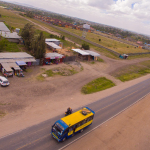Millions of Kenyans can now access microloans within minutes and consistently build-up their credit history that empowers financial inclusion and opens the doors to larger working capital facilities from other financial institutions.
Before the country embraced digital lending, it took an average of three weeks and lots of paperwork before a lending decision was made. “This is a major leap that has opened us to the benefits of automated lending to households, businesses and the general economy,” says Zenka Finance CEO Duncun Motanya.
Short-term loans
The Credit Information Sharing (CIS) system is one of the cornerstones of financial inclusion in Kenya and has made it easier for borrowers to access additional growth credit. It is a testament that a lender can use information from credit bureau score and digital footprint to make superior lending decisions. This development has also fostered economic growth and helped to lower inequality in the country.
Improved credit rating supported by CIS system has over the last couple of years allowed digital lenders like M-shwari, Tala or Zenka to provide the necessary funding to small businesses requiring quick short-term loans to thrive and shield homes from emergency shocks that could potentially slide families deeper into poverty.
Digital lenders have bridged a gap in offering much-needed credit to small business people who could not access credit because they lacked the credit score or banking history. Year after year, mobile money deployment has grown faster than any other channel to mirror the increased role of the digitization of financial services.
In 2019, Central Bank of Kenya, in draft Kenya Banking Sector Charter, compelled commercial banks to increase loans to small businesses by 20%.
A study on SMEs Competitiveness Report 2019 by the International Trade Centre, Ministry of Trade and Kenya National Chamber of Commerce and Industry (KNCCI) released in September last year shows that 33% small traders avoid commercial bank loans despite their need for credit. SMEs represented the high growth in employment creation having scooped 83.6% of the 846,000 jobs created across 2018 as per provisional data from the Kenya National Bureau of Statistics (KEBS).
“You can attest that it is now taking Kenyans a few minutes to access credit at their own comfort and many people no longer need to travel or physically present paperwork. With just a tap on your smartphone, you are able to key in crucial data points that allow lenders to rate your creditworthiness,” said Motanya.
See Also >> Earning Steady Income By Giving Small Loans to Government
According to Central Bank of Kenya, there are more than 300 million positive transaction records (that is loans that have been fully repaid by clients), showing a huge population of Kenyans including those without physical bank accounts have greatly benefited from improved access to credit over the years.
casual workers, dependents and formal employees borrow mostly for day-to-day needs.
“Kenyans will be able to enjoy even better ratings and access to more credit when it will be made obligatory for any lender to check customer’s creditworthiness by pulling real-time credit reports about customers from Credit Bureaus (CRBs) and by reporting their actual credit history to CRBs. Therefore adopting a national credit scoring system that is beneficial for all stakeholders of the financial industry is critical in advancing the next phase of credit rating in the country,” he added.
Read >> Wealthy Kenyans Make Billions From Selling a Bank
A 2018 FSD-Kenya phone survey, in partnership with the Central Bank of Kenya (CBK), Kenya National Bureau of Statistics (KNBS) and CGAP showed that casual workers, dependents and formal employees borrow mostly for day-to-day needs. Similarly, customers who run their own companies or farming operation mostly borrow for business purposes while an entrepreneur borrowing for working capital is the single most common use case for digital credit.
Using loans for business
Other important insights presented by these data sets is that digital credit appeals to younger customers who are relatively highly educated and are willing to use the loan proceeds to start their own business. This data is very critical to lenders to enhance innovativeness in coming up with new solutions to ensure many more Kenyans are financially included and their living conditions improve for better and reduce unemployment rates in the country.
“All digital lenders under the membership of Digital Lenders Association of Kenya (DLAK) have adopted a code of conduct that compliments the existing provisions of law and sets acceptable standards of service and highest possible level of satisfaction for consumers who have received or plan to receive digital loans under consumer credit. The code is based on the principles of fair business practice, professional integrity, consumer protection, acting in good faith and responsible lending,” says Motanya, the Zenka Finance CEO while speaking in Nairobi.












Leave a comment